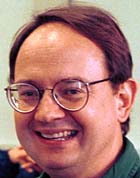The University’s David A. Balota, Ph.D., and Himadri B. Pakrasi, Ph.D., are among the 348 individuals elected as fellows of the American Association for the Advancement of Science (AAAS) for 2003.
Individuals are elected AAAS fellows in recognition of their efforts toward advancing science applications that are deemed scientifically or socially distinguished.

Balota, professor and associate chair of psychology in Arts & Sciences and professor of neurology in the School of Medicine, was chosen for his work on word recognition and reading; on the timing of mental operations; and in distinguishing between cognitive processes that are automatic and those that are controlled.
Pakrasi, professor of biology in Arts & Sciences, was recognized for his fundamental studies that developed cyanobacteria as a model system for understanding photosynthesis.
“The rank of fellow is the highest awarded by AAAS,” said Edward S. Macias, Ph.D., executive vice chancellor and dean of Arts & Sciences, “so this is quite an honor, especially because fellows are nominated and elected by their peers.
“Dave and Himadri are faculty members who do it all — excellent teachers and scholars as well as University citizens who are very generous with their time. They are both very deserving of this honor.”
Balota’s research improved understanding of cognitive breakdowns that occur in early stages of Alzheimer’s disease, including how the affliction influences the ability to acquire and retrieve memories.
“I am very pleased that Dave has received recognition for his important work in cognitive psychology,” said Henry L. Roediger III, Ph.D., chair of psychology and the James S. McDonnell Distinguished University Professor. “He has made critical contributions to multiple areas — reading, attentional control, memory, and impairments in these processes.
“His work sets a very high standard, and his being named a fellow of AAAS is richly deserved.”
A native St. Louisan, Balota earned a doctorate in psychology from the University of South Carolina in 1981 and has been a member of the WUSTL faculty since 1985.
He is a member of the promotion and tenure committee for Arts & Sciences and the Cognitive Science Interdisciplinary Research Group. He directs the Program in Linguistic Studies and is active in the Study of the Mind-Brain initiative in The Hewlett Program and the Philosophy-Neuroscience-Psychology program — all in Arts & Sciences.
Balota also chairs the board of the Psychonomic Society, the leading society of experimental psychologists, and is editor of the society’s flagship journal, Psychonomic Bulletin & Review.
He also leads the English Lexicon Project, a multi-university study. For the past decade, he has mentored high-school students’ research as part of the National Science Foundation’s Young Scholars Program.
Pakrasi specializes in photosynthesis, metal homeostasis and the biochemistry and genetics of membrane protein complexes.

Cyanobacteria are aquatic, photosynthetic organisms that manufacture their own food with the aid of light and carbon dioxide.
The oxygenic atmosphere that is so critical to life on Earth was generated by numerous cyanobacteria during the Archaean and Proterozoic eras. This changed the Earth’s atmosphere, allowing life as it is known today to arise.
Pakrasi hopes to identify different regulatory proteins and determine their functions in the biogenesis of photosystems I and II in plants and cyanobacteria. To achieve this goal, he uses various genetic, biochemical and biophysical approaches.
Pakrasi is using an integrative systems biology approach to understand how the redox environments in these organisms regulate carbon acquisition, a key factor in global warming.
“Himadri has made very significant and notable contributions to the field of photosynthesis by using cyanobacteria as his experimental organism,” said Ralph S. Quatrano, Ph.D., chair of biology and the Spencer T. Olin Professor. “He continues to use this system and to apply his findings to higher plants, where his experimental results are having a comparable impact. This prestigious award reflects this fact.
“We are all very proud of his accomplishments and how they reflect so positively on Washington University and the Department of Biology.”
Pakrasi earned a doctorate from the University of Missouri in 1984 and came to Washington University in 1987.
The new AAAS fellows will be recognized Feb. 14 in Seattle, at the association’s Fellows Forum during its annual meeting.
Comments and respectful dialogue are encouraged, but content will be moderated. Please, no personal attacks, obscenity or profanity, selling of commercial products, or endorsements of political candidates or positions. We reserve the right to remove any inappropriate comments. We also cannot address individual medical concerns or provide medical advice in this forum.